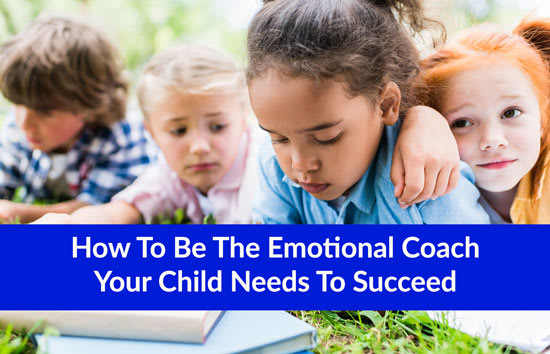When parents and caregivers act as emotional coaches for children, they provide the support and guidance required for success.
Empowering Your Child's Emotional Development: A Parent's Coaching Handbook
Parents and caregivers across all cultures intuitively want their children to be successful in life. Supporting children's emotional development is vital because emotions play a critical role in our life: they guide all we do. I write about it in my book, The Power of Emotion.

Helping children recognize, understand and manage emotions is challenging for children and adults, but it develops self-awareness, a key component of emotional intelligence. Being a good role model and acting as an emotional coach for children can produce incredible results.
Becoming an emotional coach for your child
I'm always invigorated with the positive results I see when training individuals to become more emotionally intelligent, which is an individual's ability to recognize, understand, and manage their feelings and those of others. Communicating one's emotions effectively while interpreting and responding to others is critical to success. Developing and strengthening your emotional intelligence is possible for everyone, including our children.
Ways parents can support children's emotional intelligent development
Essentially, the earlier we educate our children to understand their emotions, the quicker they develop social skills and build successful relationships. In this post, you will be surprised to learn how important emotional intelligence is to children's development.
Our brains are highly malleable, which allows us to retrain ourselves. Emotional intelligence skills are often not part of your child's school curriculum. Some of these skills are embedded in what they learn; however, it's not a crucial part of their core curriculum. That means it's up to you to instill emotional intelligence into their upbringing.
Build a strong relationship with your child.
You can start by building a deep connection. The way children manage socially is dependent upon their interrelationship with their parents.
Parents are strong role models, and from the moment a child is born, they observe their parents and caregivers and learn about the world around them. Their interactions with other children and adults teach them many life lessons. Without a doubt, developing friendships is a big part of family and community life and plays an integral role in a child's overall development and success.
Emotions send us signals that we need to pay attention to.
Keep in mind our emotions and feelings send us important signals. We must pay attention to them and consider the message, which is sometimes tricky. Judging our feelings prevents us from understanding them. It generates more emotions and reduces the possibility of understanding and working through the initial feeling. If we as adults struggle with this, consider what young children go through.
Are you interested in learning more about how our feelings send us necessary signals? You'll find a whole post on the subject here: Our Feelings Send us Vital Signals.
Learn how to be an emotional coach.
We have all witnessed a child when their emotions get hijacked, and they lose control of their behaviour in public. It's painful for the children and everyone involved! Parents respond to their children's emotions in various ways, but the best way to deal with it is to coach your child through the situation without judgment. When you act as an emotional coach in this way, it supports them by understanding their feelings and problem-solving the matter.
Are you familiar with the mechanisms of emotional hijacking? We cover those, as well as how to take control of emotional hijacking in this post.
Do you want to become a better emotional coach?
Dr. Gottman recommends the following emotional coaching steps:
- Be aware of your child's emotions.
- See emotions as an opportunity for connection and teaching.
- Listen and validate the feelings.
- Label their emotions.
- Help your child problem-solve with limits.
Parents who coach and support their children's emotional development will undoubtedly prepare them for success in life. For more information about the value of emotional intelligence, check this out. Be sure to check out many more motivational blogs here.
This article was originally published on February 2, 2019, and has been updated (May 2023).
More Motivational Reads Here »
How Emotionally Intelligent Are You?
Sign up for Linda’s monthly tips to build your Emotional Intelligence and reduce Emotional Hijacking!

















